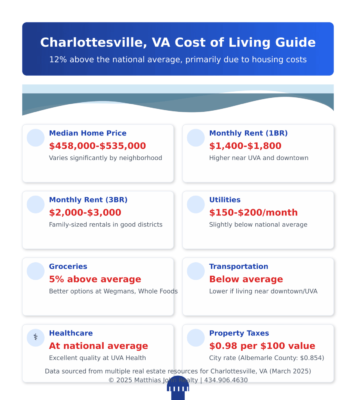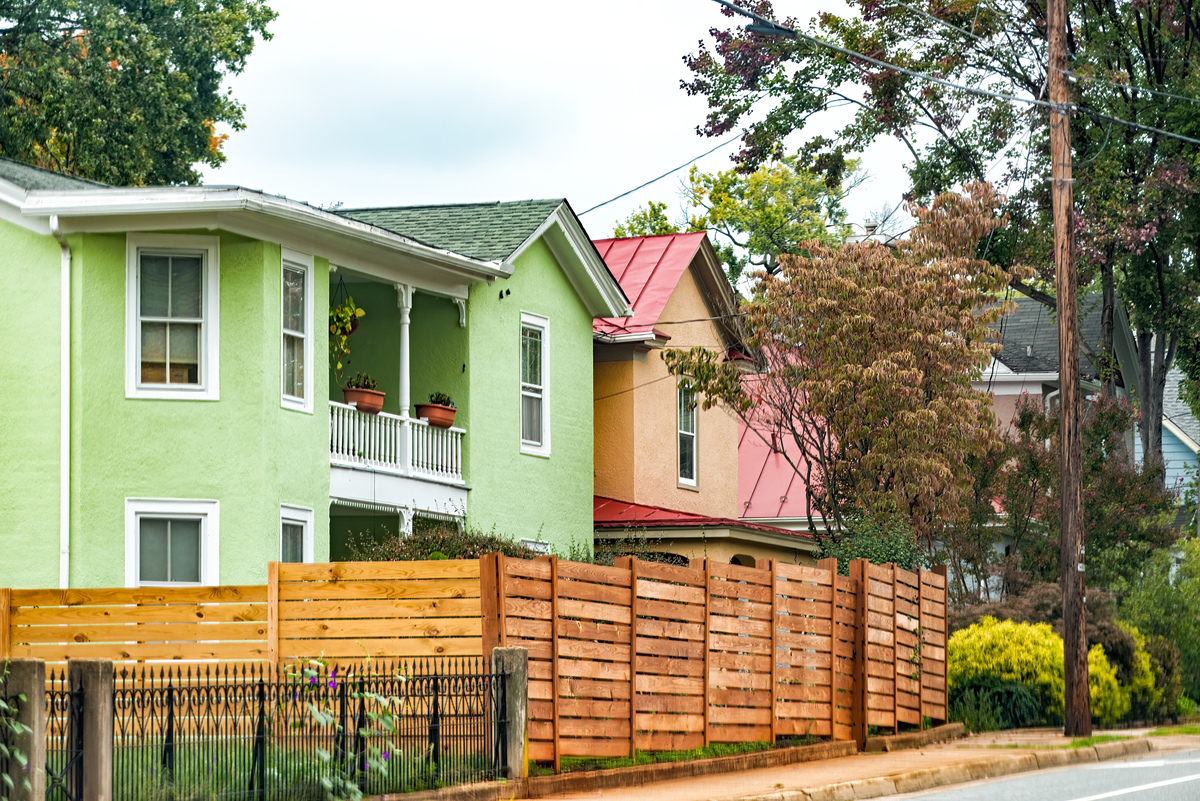Are you considering a move to Charlottesville, Virginia? Ranked consistently among Virginia’s most desirable cities with a livability score of 83/100, Charlottesville offers the perfect balance of small-town charm and sophisticated amenities. This comprehensive guide explores Charlottesville’s thriving real estate market, top-rated neighborhoods, and everything you need to know before relocating to this historic Blue Ridge community.
Why Choose Charlottesville?
Charlottesville combines historic architecture, cultural richness, and natural beauty into one exceptional living experience. As home to the prestigious University of Virginia (UVA)—founded by Thomas Jefferson himself—the city seamlessly blends academic excellence, outdoor recreation opportunities, and a diverse, welcoming community.
With approximately 45,000 residents in the city and around 150,000 in the metropolitan area, Charlottesville provides:
- Strong job market with growing opportunities in healthcare, education, and technology
- Top-ranked public and private schools throughout Albemarle County
- Four distinct seasons with mild winters and beautiful fall foliage
- Vibrant arts and culture scene featuring live music, galleries, and festivals
- Easy access to outdoor recreation, including hiking, wineries, and mountain views
For those seeking an exceptional quality of life with the amenities of a larger city but the connection of a smaller community, Charlottesville real estate offers outstanding value and investment potential.
Charlottesville Real Estate Market Overview 2025
Charlottesville’s real estate market continues to show strong performance, with property values appreciating steadily over the past decade. Current market conditions include:
- Median home price range: $450,000-$595,000 (as of early 2025)
- Average days on the market: 29 days, depending on the neighborhood
- Year-over-year price increase: 0.9%-7.5% depending on source
- Inventory levels: Moderate, with higher demand in walkable areas
- New construction: Expanding, particularly in western corridors
- Investment potential: Strong, with consistent historical appreciation
The Charlottesville housing market benefits from limited geographic expansion possibilities due to surrounding mountains and protected lands, creating sustainable long-term value for homeowners.
6 Best Neighborhoods to Live in Charlottesville, VA
1. Downtown Charlottesville/Historic Downtown Mall
Vibe: Urban, walkable, historically significant
Housing Types: Luxury condominiums, renovated historic homes, modern apartments
Price Range: Higher end ($450K-$1M+)
Ideal For: Young professionals, empty nesters, nightlife enthusiasts
Walk Score: 98 (Walker’s Paradise)
Downtown Charlottesville centers around the brick-paved Historic Downtown Mall, one of America’s longest pedestrian malls. This vibrant district features:
- Over 120 shops, restaurants, and entertainment venues
- Landmark venues like The Jefferson Theater and The Paramount
- Weekly farmers market and seasonal festivals
- Easy walking access to Court Square and City Hall
- Proximity to popular breweries like South Street and Champion
Residents enjoy a truly walkable lifestyle with virtually all daily needs accessible without a car. Historic buildings, renovated warehouses, and new luxury developments create a diverse architectural landscape with character and charm.
2. Belmont/North Downtown
Vibe: Historic charm with contemporary edge
Housing Types: Renovated bungalows, craftsman homes, new infill construction
Price Range: Moderate to high ($350K-$900K)
Ideal For: Families, culinary enthusiasts, creative professionals
Walk Score: 80+ (Very Walkable)
Once a working-class neighborhood, Belmont has transformed into one of Charlottesville’s most sought-after areas, known for:
- Award-winning restaurants like Mas Tapas, The Local, and Tavola
- Belmont Park and community gardens
- Historic architecture with modern renovations
- Walkable distance to Downtown Mall (10-15 minutes)
- Strong sense of neighborhood community
Belmont’s tree-lined streets feature character-rich homes from the early 20th century alongside thoughtful new construction that respects the area’s architectural heritage. The neighborhood is a perfect balance between residential tranquility and urban convenience.
3. Venable/Rugby Road District
Vibe: Classic university area with historic pedigree
Housing Types: Stately historic homes, some apartments, and condos
Price Range: Moderate to high ($400K-$1.2M)
Ideal For: UVA faculty, graduate students, history enthusiasts
Walk Score: 70-80 (Very Walkable)
Located adjacent to the University of Virginia’s iconic grounds, the Venable/Rugby Road area offers:
- Proximity to UVA’s Rotunda and academic buildings
- Walking distance to “The Corner” dining and retail district
- Greek Row and university athletics facilities
- Architectural significance with many historic properties
- Established tree canopies and traditional streetscapes
This neighborhood embodies Charlottesville’s connection to education and history, with many homes dating to the early 1900s. Despite its university adjacency, many streets maintain a surprisingly peaceful atmosphere, particularly as you move away from central campus areas.
4. Barracks Road/Greenbrier
Vibe: Established, family-friendly suburban feel
Housing Types: Mid-century single-family homes, townhomes, some new construction
Price Range: Moderate to high ($350K-$800K)
Ideal For: Families, professionals seeking stability
Walk Score: 39-55 (Car-Dependent to Somewhat Walkable)
The Barracks Road area combines convenience with neighborhood stability:
- Barracks Road Shopping Center with Whole Foods and diverse retailers
- Proximity to top-rated Charlottesville City Schools
- Established neighborhoods with mature landscaping
- Mix of housing styles with solid construction quality
- Easy access to Route 250 for commuting
These neighborhoods developed primarily from the 1950s-1970s and feature spacious lots, sidewalks, and community-oriented design. The area provides a traditional suburban experience while remaining just minutes from downtown amenities.
5. Crozet
Vibe: Small-town ambiance with stunning mountain views
Housing Types: Historic village homes, new planned communities, rural properties
Price Range: Wide variation ($300K-$1.5M+)
Ideal For: Nature enthusiasts, telecommuters, families
Walk Score: Variable (town center walkable, outlying areas car-dependent)
Located 12 miles west of Charlottesville, Crozet offers:
- Breathtaking Blue Ridge Mountain vistas
- Highly-rated Western Albemarle schools
- Popular breweries (Starr Hill, Pro Re Nata) and wineries (King Family)
- Charming downtown with locally-owned businesses
- Access to Shenandoah National Park and hiking trails
Crozet combines small-town living with a growing selection of amenities. The area features everything from historic downtown properties to new developments like Old Trail Village, which offers modern amenities within a walkable community design.
6. Ivy/Farmington
Vibe: Upscale, private country club adjacent
Housing Types: Luxury estates, large-lot homes, some historic properties
Price Range: Premium ($600K-$2M+)
Ideal For: Executives, established professionals, privacy seekers
Walk Score: Low (Car-Dependent)
Ivy represents Charlottesville’s most prestigious address, featuring:
- Proximity to Farmington Country Club
- Estate-sized properties with extensive grounds
- Excellent Albemarle County schools
- Traditional architecture and established landscapes
- Rural setting just minutes from the city
This area west of Charlottesville offers exceptional privacy and prestige while maintaining reasonable commute times to UVA and downtown. Homes typically feature substantial acreage, long driveways, and classic architectural styles.
Cost of Living in Charlottesville, VA
Charlottesville’s cost of living registers approximately 12% above the national average, primarily due to housing costs. Here’s what new residents can expect:

Budget-conscious buyers often explore surrounding Albemarle County communities like Hollymead, Forest Lakes, or southern neighborhoods for better value while maintaining access to Charlottesville amenities.
Charlottesville Employment: Job Market & Career Opportunities
Charlottesville boasts a diverse, resilient economy with an unemployment rate consistently below national averages. Major employment sectors include:
Healthcare
- UVA Health System – 12,000+ employees, teaching hospital
- Sentara Martha Jefferson Hospital – 1,600+ employees
- Various medical practices and healthcare technology firms
Education
- University of Virginia – 30,000+ students, 15,000+ employees
- Charlottesville City Schools and Albemarle County Public Schools
- Piedmont Virginia Community College
Technology & Innovation
- Growing startup ecosystem centered around UVA Research Park
- Technology firms specializing in biotech, software, and defense
- Remote work hub for professionals from major metro areas
Tourism & Hospitality
- Monticello and presidential historic sites
- 40+ regional wineries, breweries, and distilleries
- Boutique hotels and distinctive restaurants
Government
- Local municipal offices
- Regional state government operations
- Federal facilities in nearby counties
The Charlottesville region continues to attract employers drawn to the high quality of life, educated workforce, and strategic location between Washington DC, and Richmond.
Transportation & Walkability in Charlottesville
Getting around Charlottesville offers several convenient options:
- Overall Walk Score: 63 (Somewhat Walkable)
- Downtown Walk Score: 98 (Walker’s Paradise)
- Neighborhoods: 10th and Page, North Downtown, and Main-Starr Hill all score 80+ (Very Walkable)
- Cycling: Somewhat bikeable with an expanding network of bike lanes and the Saunders-Monticello Trail
- Public Transit: Charlottesville Area Transit (CAT) buses serve major corridors
- UVA Transit: Free shuttle service throughout campus and nearby areas
- Regional Transportation: Amtrak service to DC, Richmond, and beyond
- Highways: Easy access to I-64, Route 29, and Route 250
Average commute times remain reasonable at around 20 minutes, significantly lower than nearby Washington DC or Richmond. Many residents in central neighborhoods can easily maintain a one-car household, particularly with the Rivanna Trail—a 20-mile loop encircling the city with spurs that access parks and schools.
Top-Rated Schools in Charlottesville
Education quality represents one of Charlottesville’s strongest assets. Options include:
Charlottesville City Schools
- Burnley-Moran Elementary School (Grades K-4)
- Venable Elementary School (Grades K-4)
- Walker Upper Elementary School (Grades 5-6)
- Buford Middle School (Grades 7-8)
- Charlottesville High School (Grades 9-12)
Albemarle County Public Schools
- Murray Elementary School (Grades K-5)
- Henley Middle School (Grades 6-8)
- Western Albemarle High School (Grades 9-12)
- Albemarle High School (Grades 9-12)
Private Education Options
- St. Anne’s-Belfield School (Pre-K through 12)
- Covenant School (Pre-K through 12)
- Field School (5-8 for boys)
- Renaissance School (Grades 4-12)
- Peabody School (Pre-K through 8)
Many schools offer specialized programs in arts, sciences, and international curricula, providing excellent educational foundations for college and beyond.
Frequently Asked Questions: Moving to Charlottesville
Is Charlottesville a good place to live in 2025?
Charlottesville consistently ranks among Virginia’s most desirable communities, with a livability score of 83/10. The city offers historic charm, cultural amenities, outdoor recreation, excellent schools, and a strong job market—all within a mid-sized city environment
How is the weather in Charlottesville?
Charlottesville enjoys a moderate four-season climate with approximately 217 sunny days annually. Summers are warm (avg. high 86°F in July), winters are mild (avg. low 26°F in January), and fall brings spectacular foliage displays against the Blue Ridge backdrop.
What are property taxes like in Charlottesville?
Charlottesville City property tax rates are $0.98 per $100 of assessed value, while Albemarle County rates are slightly lower at $0.854 per $100. A $500,000 home in the city would have annual property taxes of around $4,900.
Is Charlottesville a walkable city?
Central neighborhoods like Downtown (Walk Score 98), Belmont, and the UVA area are highly walkable with excellent pedestrian infrastructure. Outer neighborhoods typically require cars for most errands, though many have internal sidewalk networks. The overall city Walk Score is 63 (“Somewhat Walkable”).
What outdoor activities are available near Charlottesville?
Residents enjoy easy access to:
- Shenandoah National Park (25 minutes)
- Blue Ridge Parkway scenic drives
- Rivanna River paddling and fishing
- Ragged Mountain and Beaver Creek reservoirs
- Miles of hiking and mountain biking trails
- Championship golf courses
Ready to Make Charlottesville Home? Let’s Talk Real Estate!
Charlottesville’s real estate market moves quickly, with the most desirable properties often receiving multiple offers. Working with a knowledgeable local agent provides crucial advantages in this competitive environment.
As your Charlottesville real estate specialist, I offer:
- In-depth neighborhood expertise
- Access to pre-market and private listings
- Skilled negotiation in competitive situations
- Connections with local lenders, inspectors, and contractors
- Ongoing market analysis to identify the best values
Home prices continue rising in Charlottesville’s most sought-after neighborhoods. Don’t miss your opportunity to find your ideal Charlottesville property. Call me today at 434-906-4630 or complete my contact form for personalized real estate guidance tailored to your specific needs.
Welcome to Charlottesville – your new Virginia home awaits!
[This comprehensive Charlottesville relocation guide was last updated in 2025. Market statistics and neighborhood information are subject to change. Contact Matthias John Realty for the most current Charlottesville real estate market data.]

Matthias John is a licensed REALTOR® serving Central Virginia since 2014. With dual Master’s degrees in Public Policy & Governance and Political Science & Linguistics, he brings analytical expertise to every real estate transaction.
Originally from Germany and multilingual, Matthias combines international perspective with deep local knowledge of the Charlottesville market. His background in public policy and sales enables him to navigate complex negotiations and regulatory requirements with precision.
Matthias specializes in helping both first-time homebuyers and property investors find opportunities that match their specific needs. His data-driven approach and commitment to transparent communication have earned him recognition among clients for his integrity and thoroughness.
As a longtime resident of Central Virginia, Matthias leverages his community connections and market insights to create customized marketing strategies for sellers and targeted property searches for buyers.
Member: National Association of REALTORS®, Virginia Association of REALTORS®

